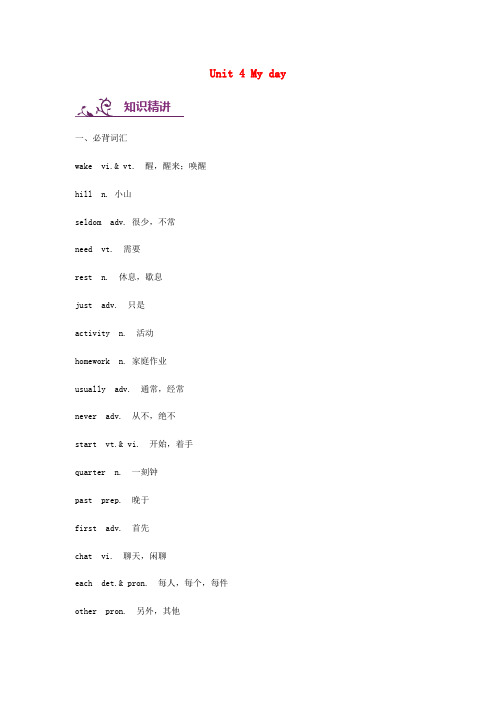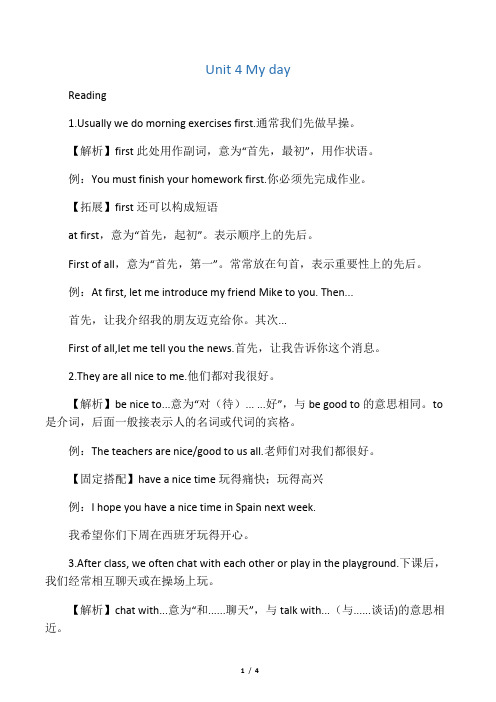英语Unit 4 My day
七年级英语上册Unit4Myday词汇与语法基础训练(新版)牛津版

Unit 4 My day 知识精讲一、必背词汇wake vi.& vt. 醒,醒来;唤醒hill n. 小山seldom adv. 很少,不常need vt. 需要rest n. 休息,歇息just adv. 只是activity n. 活动homework n. 家庭作业usually adv. 通常,经常never adv. 从不,绝不start vt.& vi. 开始,着手quarter n. 一刻钟past prep. 晚于first adv. 首先chat vi. 聊天,闲聊each det.& pron. 每人,每个,每件other pron. 另外,其他practise vi.& vt. <英>练习;训练=<美>practicewish n. 希望,祝愿 vt. 希望,祝愿life n. (pl. lives)生活;生命luck n. 好运,幸运museum n. 博物馆twice adv. 两次picnic n. 野餐once adv. 一次dislike n. 不喜爱,厌恶reason n. 原因,理由ready adj. 准备好,准备完毕learn vt.& vi. 学,学习,学会world n. 世界二、重点词汇1. seldom adverb /ˈseldəm/almost never很少;几乎从来没有例句:Now that we have a baby, we seldom get the chance to go to the cinema.有了孩子以后,我们很少有机会看电影了。
We seldom receive any apology when mistakes are made.出错的时候,我们很少听到道歉的话语。
2. activity noun /ækˈtɪvəti/the situation in which a lot of things are happening or people are moving around 活跃;繁忙;热闹例句:There was a lot of activity in preparation for the Queen's visit.大家都在为准备迎接女王来访而忙碌。
七年级上册英语Unit 4 My day Reading知识点梳理-译林版

Unit 4 My dayReadingually we do morning exercises first.通常我们先做早操。
【解析】first此处用作副词,意为“首先,最初”,用作状语。
例:You must finish your homework first.你必须先完成作业。
【拓展】first还可以构成短语at first,意为“首先,起初”。
表示顺序上的先后。
First of all,意为“首先,第一”。
常常放在句首,表示重要性上的先后。
例:At first, let me introduce my friend Mike to you. Then...首先,让我介绍我的朋友迈克给你。
其次...First of all,let me tell you the news.首先,让我告诉你这个消息。
2.They are all nice to me.他们都对我很好。
【解析】be nice to...意为“对(待)... ...好”,与be good to的意思相同。
to 是介词,后面一般接表示人的名词或代词的宾格。
例:The teachers are nice/good to us all.老师们对我们都很好。
【固定搭配】have a nice time玩得痛快;玩得高兴例:I hope you have a nice time in Spain next week.我希望你们下周在西班牙玩得开心。
3.After class, we often chat with each other or play in the playground.下课后,我们经常相互聊天或在操场上玩。
【解析】chat with...意为“和......聊天”,与talk with...(与......谈话)的意思相近。
例:Do you often chat with your friends?你经常和你的朋友们聊天吗?【解析】each other相当于代词,表示相互关系,意为“互相,彼此”。
牛津译林版英语七上Unit4《Myday》(Grammar)说课稿

牛津译林版英语七上Unit 4《My day》(Grammar)说课稿一. 教材分析《牛津译林版英语七上Unit 4 My day》主要讲述了日常生活中的活动安排和描述。
通过本单元的学习,学生能够掌握一般现在时态的运用,学会如何用英语描述自己的日常活动。
本单元的核心语法是一般现在时,学生需要掌握其构成、用法以及与一般过去时和一般将来时的区别。
二. 学情分析七年级的学生已经初步掌握了英语的基础知识,具备一定的听、说、读、写能力。
但在此阶段,学生对英语的语法知识掌握还不够深入,需要通过大量的练习来巩固。
此外,学生的学习兴趣和积极性对英语学习成果有很大影响,因此,激发学生的学习兴趣和动机是本节课的重要任务。
三. 说教学目标1.知识目标:学生能够掌握一般现在时的构成、用法,学会用英语描述自己的日常活动。
2.能力目标:学生能够在实际情景中运用一般现在时,提高英语表达能力。
3.情感目标:培养学生热爱生活、积极向上的生活态度,增强同学间的友谊。
四. 说教学重难点1.教学重点:一般现在时的构成、用法以及与一般过去时、一般将来时的区别。
2.教学难点:一般现在时的运用,特别是在具体情境中的运用。
五. 说教学方法与手段本节课采用任务型教学法,通过各种互动活动,让学生在实际操作中掌握一般现在时的用法。
同时,运用多媒体手段,如图片、视频等,辅助教学,提高学生的学习兴趣。
六. 说教学过程1.导入:以一幅描绘日常活动的图片引导学生进行观察,激发学生对课程的兴趣。
2.呈现:通过展示一段视频,让学生了解一般现在时的用法,同时引入本节课的主题。
3.操练:设计各种任务,让学生在实际操作中运用一般现在时,如描述自己的日常活动、编写对话等。
4.巩固:通过小组活动,让学生在互动中进一步巩固一般现在时的用法。
5.拓展:引导学生运用一般现在时描述未来的计划,培养学生的创新思维。
6.总结:对本节课的内容进行归纳总结,强调一般现在时的用法。
7.作业:布置相关练习,让学生课后巩固所学知识。
牛津译林版英语七上Unit4《Myday》(welcome)说课稿

牛津译林版英语七上Unit 4《My day》(welcome)说课稿一. 教材分析牛津译林版英语七上Unit 4《My day》(welcome)的话题是关于日常生活的,通过学习本单元,学生可以掌握关于日常活动的一些词汇和表达方式,如go to school, have lunch, do homework等。
同时,学生还可以学会如何用英语描述自己的日常生活。
本节课的主要内容是学习一般现在时,并通过谈论日常活动来运用一般现在时。
二. 学情分析七年级的学生已经掌握了一些基本的英语语法和词汇,但对一般现在时的理解和运用还不够熟练。
因此,在教学过程中,需要引导学生通过观察、实践和交流来理解和运用一般现在时。
此外,学生对日常活动的表达方式还不够熟悉,需要通过大量的练习和互动来提高他们的表达能力和合作能力。
三. 说教学目标1.知识目标:学生能够掌握关于日常活动的一般现在时的表达方式,如go to school, have lunch, do homework等。
2.能力目标:学生能够在适当的语境中运用一般现在时描述自己的日常生活,提高他们的语言运用能力。
3.情感目标:通过谈论日常生活,培养学生热爱生活、积极向上的态度。
四. 说教学重难点1.重点:学生能够掌握一般现在时的基本结构和用法。
2.难点:学生能够灵活运用一般现在时描述自己的日常生活,并在实际情景中进行交流。
五. 说教学方法与手段1.教学方法:采用任务型教学法,让学生在完成任务的过程中学习和运用语言。
2.教学手段:利用多媒体课件、图片、卡片等辅助教学,提高学生的学习兴趣和参与度。
六. 说教学过程1.导入:通过展示一张自己的日常照片,引导学生谈论自己的日常生活,激发学生的学习兴趣。
2.新课呈现:通过多媒体课件展示一般现在时的结构,引导学生观察和理解一般现在时的用法。
3.学习活动:学生分组进行角色扮演,用一般现在时描述自己的日常生活,如起床、上学、吃饭等。
Unit4MyDay(知识梳理)-七年级英语上册精品课堂(牛津译林版)

Unit 4 My day 一、重点词组二、重点语言点1. wake upwake 常作及物动词,意为“使醒来,唤醒” Please wake me up at seven o’clock.wake作不及物动词,意为“醒,醒来” He woke three times during the night.当wake up意为“叫醒”时,要注意宾语的位置。
如果宾语是人称代词,通常位于wake和up之间。
如果宾语是名词,则既可以位于wake和up之间,也可以位于wake up之后。
wake up your dad=wake your dad up wake me up2. It’s time for ...It’s time for sth = It’s time to do sth 该是做某事的时候了It’s time for lunch. = It’s time to have lunch. 该是吃午饭的时候了。
It’s time for sb to do sth 该是某人做某事的时候了。
It’s time for the children to go to bed. 该是孩子们上床睡觉的时候了。
3. Shall we go walking in the hills?【精讲】Shall we...?意为“我们……好吗?”,shall用于第一人称,表示提出或者征求建议,常用Good idea.或者Sounds great.来回答。
4. go outgo out 外出;出去;熄灭;过时Let's go out on Saturday night. 我们星期六晚上出去吧。
Let's go out for some fresh air. 咱们出去呼吸点新鲜空气。
The bedroom light went out after a moment. 卧室的灯片刻后熄灭了。
The fire seemed to be going out. 火看来快熄灭了。
第4单元my day

just
正好;恰好 /dʒʌst/
8
museum
博物馆 /mju:'ziəm/
9
never
从不 /'nevə(r)/
10
picnic
野餐 /'pɪknɪk/
11
have breakfast
吃早餐
12
have dinner
吃晚饭
13
have lunch
吃午饭
14
learn
学;学习;学会 /lɜ:(r)n/
玩得高兴
49
have fun
尽情玩
50
have lessons
上课
51
be late for
迟到
52
get ready for sth
为……准备好
23
shall
表示征求意见 /ʃæl, ʃəl/
24
life
n.生活;生命 /laɪf/
25
lives
n.(pl.)生活;生命 /laɪvz/
26
past
prep.晚于;过(时间)adj.过去的 /pɑ:st/, /pæst/
27
quarter
n.一刻钟;四分之一 /'kwɔ:(r)tə(r)/
28
第4单元my day
第4单元My day_译林版七年级英语上册单词听写_单词表
第4单元My day
1
hill
山丘;小山 /hɪl/
2
go to bed
上床睡觉
3
first
(1st)第一的 /fɜ:(r)st/
4
wake up
叫醒
5
roller skating
牛津七年级上册英语7AUnit4 My Day知识点总结

7AU4 My Day 知识点一.知识点1. wake up 醒来,叫醒把米莉叫醒wake up Millie = wake Millie up 把我叫醒wake me up妈妈每天早早把我叫醒。
Mum wakes me up early every day.我不想叫醒你。
I don’t want to wake you up.不要叫醒那个婴儿,他要哭的。
Don’t wake up the baby. He will cry.2. Is it time for breakfast? 早餐时间到了吗?It’s time for sth.= It’s time to do sth.做……的时间到了。
上课/上学/睡觉/午饭/开会时间到了。
It’s time to have classes. = It’s time for class.It’s time to go to school.=It’s time for school.It’s time to go to sleep/bed.=It’s time for sleep.It’s time to have lunch. = It’s time for lunch. It’s time to have the meeting. = It’s time for the meeting. It’s time for sb. to do sth. 某人该干某事了。
我们该吃晚饭了。
It’s time for us to have supper.他们该上课了。
It’s time for them to have classes/lessons.你该擦黑板了。
It’s time for you to clean the blackboard.3. Shall we go walking in the hills? 我们去山上散步,好吗?Shall we + do …? (=Let’s do sth, shall we?) 是一个表示提出建议的句型(=What about doing sth?= How about doing sth?=Why not do sth?=Why don’t you do sth?)Shall we go to the cinema tomorrow? Shall we play basketball this afternoon?go shopping/swimming/running/fishing4. seldom 很少,不常(adv ) ,表示否定seldom : not (very) often Tom seldom goes to school. never 从不,绝不我上学从不迟到。
2023牛津译林版七年级上册Unit 4《My day》(Reading I)课件

After-school activities
Paragraph 2
When does Millie’s school start?
At eight in the morning.
They always chat with each other or play in the playground.
read books
do after-school activities
practise playing volleyball
chat with each other
have a good time
Which is Millie’s favourite subject?2. What does Millie like doing?
a lot of
chat
Reading CБайду номын сангаасub
Tuesday
Thursday
J: Does Millie like sports?T: Yes. She likes playing volleyball. She’s in the school _____________. They _______ after school on ___________________.
volleyball team
practise
Wednesday afternoon
Try to retell Millie’s day
Time
Events
8:00 a.m.
do morning exercises
Millie likes her school very much.
2. School starts at 8:15 at Millie’s school.
- 1、下载文档前请自行甄别文档内容的完整性,平台不提供额外的编辑、内容补充、找答案等附加服务。
- 2、"仅部分预览"的文档,不可在线预览部分如存在完整性等问题,可反馈申请退款(可完整预览的文档不适用该条件!)。
- 3、如文档侵犯您的权益,请联系客服反馈,我们会尽快为您处理(人工客服工作时间:9:00-18:30)。
★ It ★ It
2.I dislike / don’t like ( to do sth/ doing sth). ★ I am not very tall/strong, so …
★ It’s ★ It’s
not good for us. boring(无聊的)/hard(困难的) .
Talk about your likes and dislikes.
A: Does Millie love/like/dislike… ? B: Yes,she does. A: Why does she love/like/dislike… ? B: because…
Morning exercises
They are good for them. They help her get ready for the day.
Homework
1. Remember the expressions in this lesson.
2. Learn to talk about the reason of
likes and dislikes
Read about Millie’s likes and
dislikes in the table in Part A on Page 52. Then complete
Part B on Page 53.
Explanation
1.learn a lot about… 多了解…… 我想更多地了解你的学校。 I want to learn a lot about your school. 2. be good/bad for ...对…有好/坏处。 吃水果有益于我们的健康(health) 。
7A Unit 4 My day
--- Task
Love Like Dislike
Morning exercises
Lessons Basketball
Love
Like Dislike
Reading Drawing Homework
Look at the table on Page 52,talk about Millie’s likes and dislikes.
Eating fruit is good for our health.
看电视太多对我们的眼睛有害。
Watching TV too much is bad for our eyes.
3.too much +不可数名词 太多…
他有太多的钱,但他没有太多的朋友。 He has too much money, but he doesn’t have too many friends. 4. get ready for…为……做准备 我们正在为野餐做准备。
We are getting ready for the picnic.
Summary
Useful expressions
1. I like / love sth (to do sth / doing sth).
My favourite subject is …
★I
can lean a lot about…/It helps us … is fun / interesting. is /they are good for us.
Lessons
Teachers are nice and the
subjects are interesting.
Basketball
She is not tall ,so she cannot play it well.
Reading
She wants to learn more about the world.
Drawing
It isalways has too much homework.
According to Millie’s likes and dislikes to fill in the sentences: 1. She loves ____________ because her teachers are _____ lessons nice and the subjects are interesting ____________. 2. Millie loves __________ because she wants to reading _______________________the world. learn a lot about 3. She likes __________________ because they are good for morning exercises her and it helps her _________________the day. get ready for drawing 4. She likes ________ because it is fun. 5. She dislikes basketball ___________because she is not tall and she cannot play it well. 6. She dislikes___________ because they always have homework ___________homework too much
A:What activity do you love ? I love _______ because__________. What activity do you like ? I like ________ because _________. What activity do you dislike ? I dislike ______ because________ .
